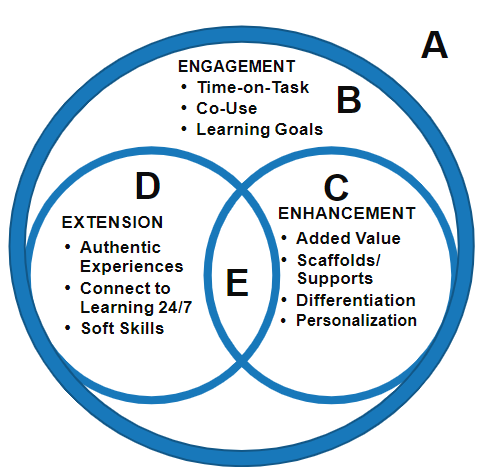OTAN News
Evaluating Technology Use with the Triple E Framework
As you integrate more technology into your instruction, it becomes important to evaluate the effectiveness of technology use in the classroom and whether it skims the surface of effectiveness or makes an impact in a deep and meaningful way. There are a number of frameworks that help educators understand the connection between learning and technology, including SAMR, TPACK, and TIM, and now we have the Triple E Framework to help with evaluation.
 Diagram of Triple E Framework from EdTech Center @WorldEd
Diagram of Triple E Framework from EdTech Center @WorldEd
The Triple E Framework was developed by Liz Kolb at the University of Michigan in the early 2010s and is spelled out in her book, Learning First, Technology Second: The Educator’s Guide to Designing Authentic Lessons. The Triple E’s are Engage, Enhance, and Extend, and Professor Kolb states that the framework is different from others because it is the only one that directly focuses on how technology helps students achieve their learning goals. The Triple E Framework, in her estimation, brings together instructional strategies, learning goals, and purposeful technology tool selection.
Although Kolb designed Triple E for use by K-12 teachers and administrators, Susan Gaer and Kristi Reyes explain how the framework can be adapted for use by adult educators in their article, The Triple E Framework for More Effective Technology Integration in Adult Education. Susan and Kristi first detail what Engagement, Enhancement, and Extension look like in adult education classrooms and how we want teachers to move beyond students merely engaging with technology, especially when technology is present, but students are not collaborating with others on activities that use technology. Enhancement moves students from consumers of technology to creators, and there are a number of ways that students can take ownership of their learning. (Read our recent OTAN article, Different Ways that Students Can Demonstrate Learning, for project ideas.) Extension is more than homework; we want students to use technology to match what they are learning and using in the classroom with the goals they are working on achieving in their lives. Maybe it’s a student using technology, for example, to more quickly learn the vocabulary they need for their workplace, after practicing with tech tools in class and identifying the tool that is most helpful.
If you would like to learn more about and explore using the Triple E Framework at your agency, please contact OTAN at support@otan.us or call our office at 916-228-2580 to schedule a Triple E Framework training today!
Article: The Triple E Framework for More Effective Technology Integration in Adult Education from the EdTech Center @WorldEd
Website: Triple E Framework

